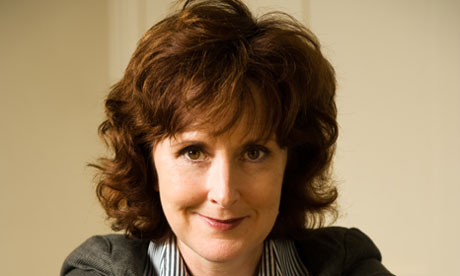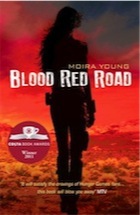A post-apocalypse Costa winner

Moira Young won the Costa prize for Blood Red Road. Photograph: Benjamin Harte
It's easy to see the attraction of post-apocalyptic fiction. Narratives set in ravaged versions of our future can lay claim to some of the moral seriousness of the best SF, while indulging in the extravagant colouring of fantasy. So, we can have works conveying both a stark warning about what will happen to the planet if we fail to recycle or look after the whales, combined with a tale of quests, horses and crossbows.
 The genre has been graced by some of the finest works of speculative fiction, from Richard Jefferies's haunting After London to Cormac McCarthy's dark masterpiece, The Road. Many writers for children and teenagers have, in turn, been drawn to the dystopian future, with Julie Bertagna's excellent Exodus trilogy being one highlight. However the field was transformed (commercially, at least) by Suzanne Collins's The Hunger Games, which dispensed with the traditional philosophical musings and pumped in cheap gore and trashy spectacle.
The genre has been graced by some of the finest works of speculative fiction, from Richard Jefferies's haunting After London to Cormac McCarthy's dark masterpiece, The Road. Many writers for children and teenagers have, in turn, been drawn to the dystopian future, with Julie Bertagna's excellent Exodus trilogy being one highlight. However the field was transformed (commercially, at least) by Suzanne Collins's The Hunger Games, which dispensed with the traditional philosophical musings and pumped in cheap gore and trashy spectacle.
Moira Young's Blood Red Road is more Hunger Games than Oryx and Crake. Like Collins's novel, it comes with a blockbusting movie deal, but also with a – to me rather baffling – Costa Book award. At its best the novel mashes together McCarthy's intensity with a laconic narrative style taken from the literature of the American west. There are echoes of Willa Cather's novels of struggle as well as film classics such as The Searchers or True Grit.
At its worst it is a risible collection of clichés strung together by a barely coherent plot. From the outset we are solidly in quest mode, as 18-year-old Saba and her kid sister go in search of their brother, kidnapped and destined to be sacrificed to help rejuvenate the local warlord, who somewhat bizarrely models himself on Louis XIV. Along the way, Saba is captured by a couple of improbably Dickensian characters, who sell her on to the local cage-fighting operation. She escapes with the help of an all-girl gang of outlaws, and, accompanied by a handsome hunk, goes on to a final epic confrontation with the bad guys.
Although it's undoubtedly packed with incident, too much happens that is purely for narrative convenience. Escapes are achieved with a leap and a bound, sapping any real sense of danger. Your boyfriend's about to be eaten by a giant hellwurm? No sweat – jog up its back and stab it in the eye. Job done. Nothing exciting occurred for a while? Well, let's have a flood in this hitherto parched world, leading to a rescue on the lip of a crashing waterfall.
Throughout, there is a disabling loss of nerve. In the cage-fighting section, Young had the opportunity to make Saba an interestingly compromised figure rather than simply a rather grumpy one. The fights are to the death, but the killing is done by the crowds. So Saba is made to fight for her life, but not actually to kill for it. The romance is as sexless as Twilight and the much-praised phonetic rendering of the language is limited to little more than the dropping of "g" at the end of words and the substitution of "ezzackly" for "exactly". It's not quite Riddley Walker or Cloud Atlas.
But perhaps that's all for the best. My nine-year-old daughter got hold of my review copy and was so entranced that I had to machete it into sections so we could both carry on reading it. Yes, this is the perfect apocalypse for pre-teens.
• Anthony McGowan's The Knife that Killed Me is published by Definitions
 The genre has been graced by some of the finest works of speculative fiction, from Richard Jefferies's haunting After London to Cormac McCarthy's dark masterpiece, The Road. Many writers for children and teenagers have, in turn, been drawn to the dystopian future, with Julie Bertagna's excellent Exodus trilogy being one highlight. However the field was transformed (commercially, at least) by Suzanne Collins's The Hunger Games, which dispensed with the traditional philosophical musings and pumped in cheap gore and trashy spectacle.
The genre has been graced by some of the finest works of speculative fiction, from Richard Jefferies's haunting After London to Cormac McCarthy's dark masterpiece, The Road. Many writers for children and teenagers have, in turn, been drawn to the dystopian future, with Julie Bertagna's excellent Exodus trilogy being one highlight. However the field was transformed (commercially, at least) by Suzanne Collins's The Hunger Games, which dispensed with the traditional philosophical musings and pumped in cheap gore and trashy spectacle.Moira Young's Blood Red Road is more Hunger Games than Oryx and Crake. Like Collins's novel, it comes with a blockbusting movie deal, but also with a – to me rather baffling – Costa Book award. At its best the novel mashes together McCarthy's intensity with a laconic narrative style taken from the literature of the American west. There are echoes of Willa Cather's novels of struggle as well as film classics such as The Searchers or True Grit.
At its worst it is a risible collection of clichés strung together by a barely coherent plot. From the outset we are solidly in quest mode, as 18-year-old Saba and her kid sister go in search of their brother, kidnapped and destined to be sacrificed to help rejuvenate the local warlord, who somewhat bizarrely models himself on Louis XIV. Along the way, Saba is captured by a couple of improbably Dickensian characters, who sell her on to the local cage-fighting operation. She escapes with the help of an all-girl gang of outlaws, and, accompanied by a handsome hunk, goes on to a final epic confrontation with the bad guys.
Although it's undoubtedly packed with incident, too much happens that is purely for narrative convenience. Escapes are achieved with a leap and a bound, sapping any real sense of danger. Your boyfriend's about to be eaten by a giant hellwurm? No sweat – jog up its back and stab it in the eye. Job done. Nothing exciting occurred for a while? Well, let's have a flood in this hitherto parched world, leading to a rescue on the lip of a crashing waterfall.
Throughout, there is a disabling loss of nerve. In the cage-fighting section, Young had the opportunity to make Saba an interestingly compromised figure rather than simply a rather grumpy one. The fights are to the death, but the killing is done by the crowds. So Saba is made to fight for her life, but not actually to kill for it. The romance is as sexless as Twilight and the much-praised phonetic rendering of the language is limited to little more than the dropping of "g" at the end of words and the substitution of "ezzackly" for "exactly". It's not quite Riddley Walker or Cloud Atlas.
But perhaps that's all for the best. My nine-year-old daughter got hold of my review copy and was so entranced that I had to machete it into sections so we could both carry on reading it. Yes, this is the perfect apocalypse for pre-teens.
• Anthony McGowan's The Knife that Killed Me is published by Definitions
No comments:
Post a Comment